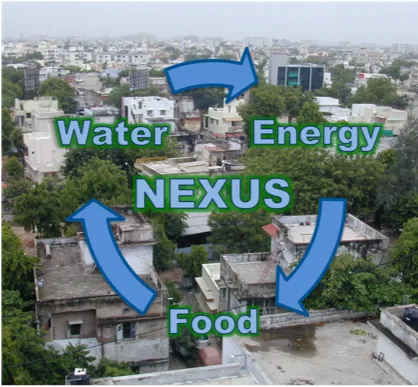Nexus Research Group

The Nexus Research Group has been conducting research on integrated urban planning and the WEF Nexus topic at TUM since 2013. The group conducts transdisciplinary research by engaging pro-actively with a number of case study cities mainly in Africa, Asia and Europe. The research group aims to co-create innovative urban planning models at urban scales by working with a range of stakeholders in a participatory process. It further supports the implementation of these models in the real world as a basis for research on the key performance indicators (KPIs)to enable operationalization of the WEF Nexus approach. The results of this research in turn are used for teaching purposes. Key outputs of the group include research articles and policy recommendations.
The Nexus Research Group highlights key Nexus synergy opportunities between climate change mitigation and adaptation strategies and measures to support acceleration of climate action. These key synergy opportunities are entry points for cities to leverage on the WEF Nexus approach. The Nexus approach can help to design sustainable urban transformation pathways based on enabling metropolitan-scale recovery of a range of valuable products currently considered “waste”: 1) water inherent in “wastewater” including rainwater for various including drinking, irrigation of agriculture and parks, toilet flushing, groundwater recharge, car-washing, etc., 2) energy, e.g., thermal energy emitted by industries, as well as energy generation from co-digestion of sewage and organic waste, to be used as biogas for cooking or conversion to electricity, or biofuel for use in public transportation, and 3) nutrients, e.g., in form of organic fertilizer, and other substances including bio-plastics, minerals like iron, salts and antibiotics. These resources have increasing economic value in emerging markets, supporting operationalization. Thus, deploying the Nexus approach can support effective management of the WEF security Nexus. So far however, very few cities worldwide are deploying a Nexus approach systematically, and no comprehensive policy guidelines exist to advise municipal governments on how to do this. The Nexus Research Group focuses on generating evidence on the co-benefits of deploying a Nexus approach in terms of water and energy conservation, food security, reduction of greenhouse gas emissions, and others.
Besides implementation of ongoing WEF Nexus research projects, activities of the Nexus Research Group include organization of international workshops to actively engage with a range of stakeholders with a focus on augmenting policy impact in support of a socio-technical transition geared towards enabling a more circular economy.